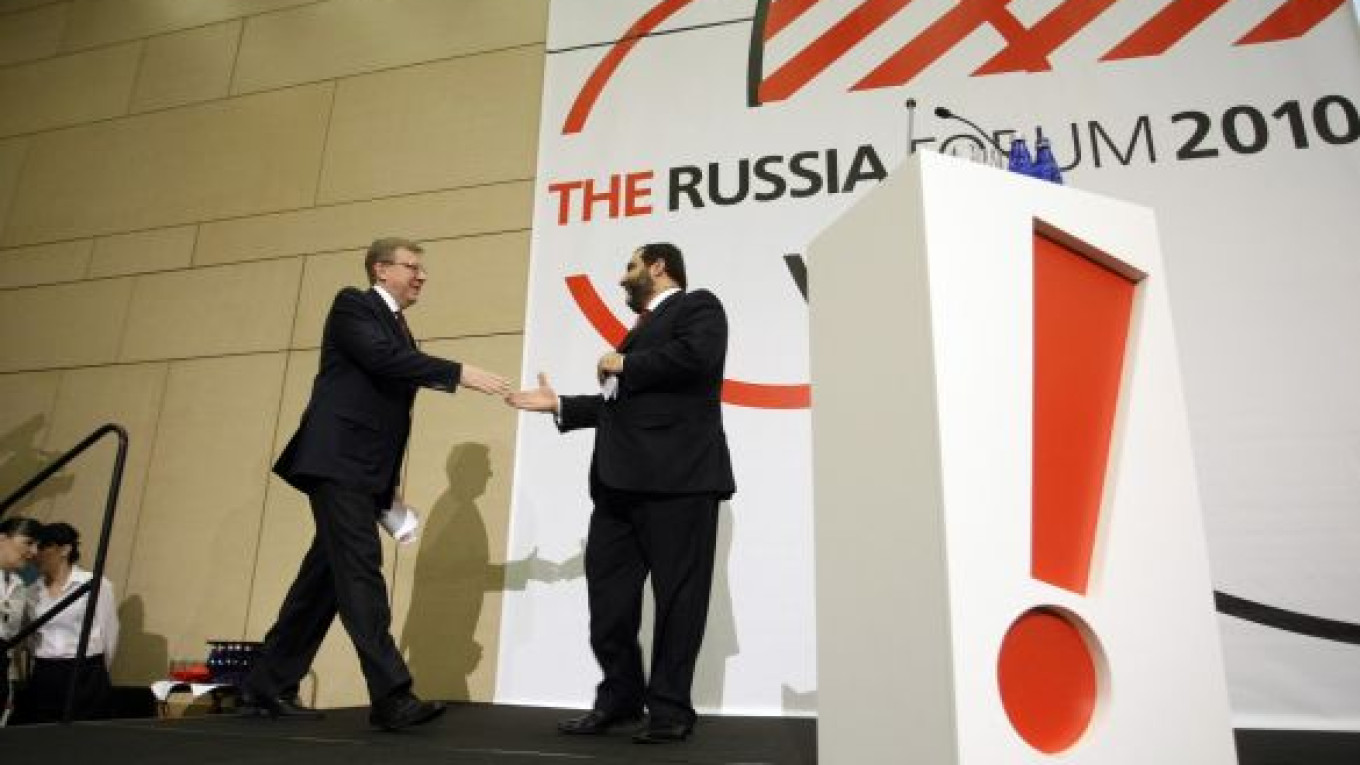Executives at some of the country's top consumer goods companies said Wednesday that while the crisis took a toll on their business, it also provided a number of valuable lessons about Russian consumers.
But a panel at Troika Dialog's annual Russia Forum found that the lessons learned were as varied as the goods they sell.
The recession taught businesses to look at their products more precisely, said Stefan de Loecker, CEO of Nestle for Russia and the Eurasia region.
“Many businessmen blamed the crisis for the sales drops, but it was not always the case,” he said. ?€?The crisis showed weakness of some brands and products. It revealed that some goods don’t offer enough value for money to the consumer and made businessmen improve their assortment.?€?
Consumers here are quite quality-dependent and will not switch to cheap brands so easily, said Mikhail Kusnirovich, chairman of the board at Bosco di Ciliegi, a major sports clothing manufacturer and retailer.
?€?In this country, people have a sane consumer mentality, and their consumption depends on the overall mood,?€? he said. ?€?As you can see, people have not switched from toothpaste to dental powder.?€?
The key for building a successful business, then, while demand is floating near bottom is to enhance your offer, Kusnirovich said.
?€?Imagine that you are a restaurateur and you have fewer clients, and all of a sudden you decide to cut 70 percent of the items on your menu. You may well guess what business results you'll achieve,?€? he said. ?€?You need to dance before your consumer. You should make the consumer fall in love with you. Only then will you be a success!"
Others on the panel said they learned that even emerging markets could some day retreat.
?€?I remember sitting in my office 18 months ago, with oil prices at $150 per barrel and the ruble feeling historically strong against the dollar,?€? said Richard Smyth, president of Mars for Europe and the CIS. ?€?We had a ninth year of consecutive growth, and I could never believe things would go as wrong as they did.?€?
The recession made plenty of businessmen think of closing up shop, said Rostislav Ordovsky-Tanayevsky Blanco, president of Rostik Group, which owns and operates a number of restaurant chains.
?€?In March [2009], we all thought we're going to die,?€? he said. ?€?The crises in Russia have a national peculiarity: They are much stronger and much shorter, and on top of that we all have a short memory.?€?
Alcohol — and especially the vodka market ?€” fell amid the recession as the share of counterfeit trade increased, said Alexander Mechetin, chairman of Synergy, a major vodka producer.
?€?Sales of cheaper vodka brands fell most significantly, as more low-income consumers preferred to buy counterfeit vodka and save money,?€? he said. ?€?As for premium-priced vodkas, our company had a surprise sales upturn of 20 percent for our Beluga premium brand.?€?
He attributed the growth to middle-class consumers who used to drink imported whisky or cognac before the crisis but switched to high-end domestic brands. The swap allowed them to feel like they were maintaining their quality of life while saving money, especially as import prices rose because of the ruble devaluation, he said.
But cutting prices, a tactic used by many Russian clothing retailers in 2008 and 2009, drastically decreases the goods' perceived value for consumers and the image of retailers, said Kusnirovich, of Bosco.
?€?Those who could buy a jacket for full price want to feel they can afford it at 100 percent and not at a 70 percent discount,?€? he said. ?€?Consumers who only can afford quality clothes at 70 to 80 percent discounts, will think: Look how much these retailers overpriced their stuff during good times ?€” even with these discounts they make fair margins!?€?
On the whole, retailers are optimistic about the Russian market, said Synergy's Mechetin.
?€?A man stays a man, and a consumer stays a consumer. People will keep on buying premium-priced goods and going to restaurants,?€? he said. ?€?And as long as they do so, we will have high margins.?€?
A Message from The Moscow Times:
Dear readers,
We are facing unprecedented challenges. Russia's Prosecutor General's Office has designated The Moscow Times as an "undesirable" organization, criminalizing our work and putting our staff at risk of prosecution. This follows our earlier unjust labeling as a "foreign agent."
These actions are direct attempts to silence independent journalism in Russia. The authorities claim our work "discredits the decisions of the Russian leadership." We see things differently: we strive to provide accurate, unbiased reporting on Russia.
We, the journalists of The Moscow Times, refuse to be silenced. But to continue our work, we need your help.
Your support, no matter how small, makes a world of difference. If you can, please support us monthly starting from just $2. It's quick to set up, and every contribution makes a significant impact.
By supporting The Moscow Times, you're defending open, independent journalism in the face of repression. Thank you for standing with us.
Remind me later.


